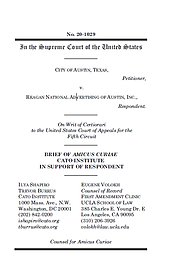Learn more about Cato’s Amicus Briefs Program.
Austin’s digital sign code distinguishes “on-premise” from “off-premise” signs, prohibiting the construction of new, digital “off-premise” signs—that is, signs that advertise products or businesses located elsewhere—while at the same time allowing for new “on-premise” signs. The regulation appears innocuous at first blush, but in practice it is impossible to tell whether a sign is “off-premises” withoutscrutinizing the message, the content, of the sign. In First Amendment law, that means the ordinance is “content-based.” The Supreme Court has long held that content-based government regulation of speech is presumptively unconstitutional under the First Amendment. Content-based restrictions can easily become a vehicle of tyranny, used to stifle discussion and quash dissent.
Moreover, the restrictions in the code also apply to noncommercial speech, such as political advocacy or religious expression. Reagan National Advertising, an operator of billboards in the city, challenged the law on First Amendment grounds. The district court ruled for the city, but the Fifth Circuit reversed (Cato filed a brief in the Fifth Circuit). Austin then filed a petition for a writ of certiorari to the Supreme Court, which was granted. The Court will hear arguments in the October term.
Cato has joined with First Amendment expert Professor Eugene Volokh and the UCLA Law Supreme Court Clinic on an amicus brief in support of Reagan National Advertising. Our brief explains that Austin’s sign code is a content-based restriction on speech because it the city must evaluate the message of a sign to determine whether it is “directing attention to a business, product, service, etc.” which is generally conducted “elsewhere than on the premises where the sign is located.”
For example, a digital sign at a church advertising the time of service would be acceptable, but a sign at a church urging congregants to vote for a pro-life ballot measure would not be acceptable because voting is an activity that occurs elsewhere. Similarly, a Planned Parenthood clinic could maintain a digital sign advertising its services, but not one directing people to support a pro-choice initiative at the polls. Because Austin’s sign code cannot be enforced without scrutinizing the message of a sign to determine whether it is “off-premises,” the code is a presumptively unconstitutional content-based restriction of speech.
Furthermore, the sign code produces discriminatory effects and may chill speech as well. Because there are more commercial premises than noncommercial premises in Austin, in practice the law will privilege commercial speech over noncommercial speech. To take an extreme example: if an organization maintains no premises in Austin, then it would be completely precluded from expressing its ideas through digital signs. Additionally, because the sign code requires signs to be on-premises, it may have a chilling effect on speech by depriving groups of anonymity; it could open holders of unpopular views to retaliation by an intolerant majority.
For these reasons, the Supreme Court should affirm the decision of the 5th Circuit holding that Austin’s sign code is an unconstitutional content-based restriction on free speech in violation of the First Amendment.

This work is licensed under a Creative Commons Attribution-NonCommercial-ShareAlike 4.0 International License.



